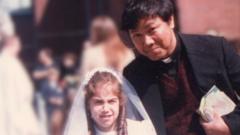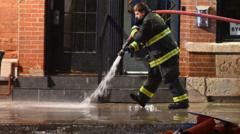Survivors of clerical sexual abuse express skepticism regarding Pope Francis' measures to address the Church's longstanding crisis. While acknowledging his efforts to reform internal processes, they argue that much remains to be done for justice and transparency.
Survivors Demand More Accountability from Catholic Church After Pope Francis' Tenure

Survivors Demand More Accountability from Catholic Church After Pope Francis' Tenure
As cardinals gather to select a new pope, abuse survivors reflect on Pope Francis' legacy, questioning if he did enough to combat clergy sexual abuse.
The discussions among the 133 cardinals in Rome about choosing a new pope are overshadowed by the legacy of Pope Francis, particularly in relation to how he dealt with clergy sexual abuse. Though he has been more open about acknowledging victims and enacting reforms compared to his predecessors, many survivors believe that his actions fell short of what is truly needed.
Alexa MacPherson, who was sexually abused by a priest starting at the age of three, recalls a traumatic history that has continued to inform her views on the Church's handling of such abuses. When she was nine, her father discovered the priest, Peter Kanchong, attempting to rape her. The Church's reaction during the court proceedings in 1984 highlighted its prioritization of reputation over the pursuit of justice; Archbishop Bernard Law’s hidden letter indicated an effort to shield the priest and minimize scandal.
MacPherson, while acknowledging that the abuse occurred long before Francis' papacy, suggests that the ongoing revelations of clerical abuse underscore a monumental failure on the part of the Church leadership, including the current pontiff. "There's just so much more that the Church and the Vatican and the people in charge can do," she stated.
The chilling revelation of Law's correspondence came to light only in 2002, amid a landmark ruling which forced the Church to disclose hidden documents. These files showed a recurring pattern where accused priests were merely relocated instead of held accountable. Following a civil lawsuit where MacPherson and over 500 other victims received an $85 million settlement, Law’s continued role in the Church only contributed to the survivors' sense of betrayal.
Critics assert that while Pope Francis has made some strides, such as organizing a significant conference on the abuse crisis and revising Church law to allow some cooperation with civil authorities, his efforts are insufficient. “We have to litigate in court to get documents, nothing really has changed,” said MacPherson’s attorney, indicating an ongoing culture of secrecy.
MacPherson called for a full disclosure of all known cases of abuse, insisting that the Church should not protect predators or those who covered up their actions. "One of the biggest things is turning over predatory priests... and holding them accountable," she argued, expressing frustration at the ongoing shield provided by the Vatican.
As the world watches the proceedings surrounding Pope Francis' funeral and the selection of his successor, MacPherson finds the coverage painful, suggesting that it glorifies the very institution that failed to protect her and others. Meanwhile, Kanchong remains unconvicted and has not faced excommunication, with his status marked as unresolved by the Church.
Despite the systemic changes that proponents believe were initiated under Pope Francis, survivors like MacPherson remain deeply skeptical that the Church is capable of true reform. In her view, genuine progress hinges on the Church’s ability to acknowledge its sins and hold those responsible accountable, stating emphatically, "You cannot possibly do any of that until you truly acknowledge those sins."























